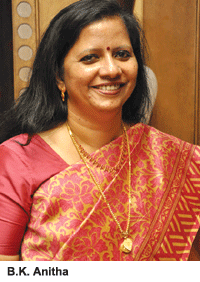Higher education in the southern state of Karnataka (pop. 59 million) is in deep crisis. Over the past few months the state’s 18 government-controlled universities have been hit by a series of scandals — massive fiddling with written exam papers at the Rajiv Gandhi University of Health Sciences; corruption in recruiting non-teaching staff at the Hassan and Mysore medical colleges; and manipulation of exam answer sheets of over 800 engineering students of Visvesvaraya Technological University, among others. Now to this list of scandals add routine sexual harassment of students by faculty in Mysore University (MU, estb.1916).
On March 5, the peace of the 739-acre main campus of MU was shattered following a suicide attempt by M. Saritha, a zoology Ph D student, because of allegedly constant sexual harassment by her research guide Prof. Shivabasavaiah. In a statement to the Mysore police, Saritha alleged that Prof. Shivabasavaiah had been harassing her for sexual favours for several months. She also alleged that when she comp-lained to vice chancellor Dr. V.G. Talwar, he advised her to “change her guide and continue with her research”. Subsequent to her FIR, Shivabasavaiah and Talwar were booked on sexual harassment and abetment charges with the state government also ordering an enquiry by chief secretary S.V. Ranganath.
Unfortunately this is not a one-off incident. According to university authorities, 26 complaints of sexual impropriety against faculty have been registered in the past six years in this once prestigious university whose alumni include Dr. Sarvepalli Radha-krishnan, former president of India; N.R. Narayana Murthy, chief mentor of Infosys Technologies Ltd; and celebrated cartoonist R.K. Laxman.
The rot in Mysore University is only one symptom of a deep malaise afflicting Karnataka’s 1,500 colleges and 18 universities. Over the past three decades caste-based faculty appointments, admission and exam-related scandals, nepotism and routine interference from the state’s rustic politicians have played havoc and severely damaged the reputations of government-controlled universities. In particular, persistent political interference with faculty appointments has resulted in the steady decline of teaching-learning standards and reduced state government funded universities including Bangalore, Mysore and Karnatak University at Dharwad into degree dispensing shops producing ill-prepared, low-calibre graduates and postgrads rubbished by India Inc.
With rustic neo-literate politicians scrambling to pack state government funded colleges and universities with kith and kin equipped with dubious degrees including Ph Ds awarded by obscure universities deep in the state’s hinterland, it’s hardly surprising that academic excellence is history in most government institutions of higher learning with rock-bottom standards and fees, caste-consciousness, marks-tampering scandals and sexual harassment of women students.
 Unsurprisingly in the period 1998-2007, the state’s 18 universities enroled a mere 2,789 students in doctorate programmes with less than half of them being awarded Ph Ds of suspect quality. “There’s no doubt that there’s wide scale corruption, nepotism and sexism in Karnataka’s government colleges and universities. Over 50 percent of students who enrol in Ph D programmes drop out, unable to deal with these evils,” says Dr. B.K. Anitha, associate professor, School of Social Sciences at the National Institute of Advanced Studies, Bangalore.
Unsurprisingly in the period 1998-2007, the state’s 18 universities enroled a mere 2,789 students in doctorate programmes with less than half of them being awarded Ph Ds of suspect quality. “There’s no doubt that there’s wide scale corruption, nepotism and sexism in Karnataka’s government colleges and universities. Over 50 percent of students who enrol in Ph D programmes drop out, unable to deal with these evils,” says Dr. B.K. Anitha, associate professor, School of Social Sciences at the National Institute of Advanced Studies, Bangalore.
Prof. M.S. Thimmappa, former vice chancellor of Bangalore University, agrees that the main cause of the deep malaise afflicting higher education in the state is nepotism and rampant political interference with faculty appointments. “Political interference and nepotism have destroyed academic autonomy in higher education institutions in Karnataka. Merit has taken a back seat and the 22 percent reservation in faculty for SCs and STs is being misused to appoint under-qualified faculty. The government must immediately restore academic and administrative autonomy of universities and faculty appointments must be made transparent, merit-based and performance-linked,” says Thimmappa.
Yet given that successive governments elected on the basis of complicated caste calculations and alliances have subsumed and suborned Karnataka’s once-reputed public institutions of higher learning, expecting government — especially the incumbent scandal-per-day BJP government — to stem the rot is asking for the moon.
Swati Roy (Bangalore)